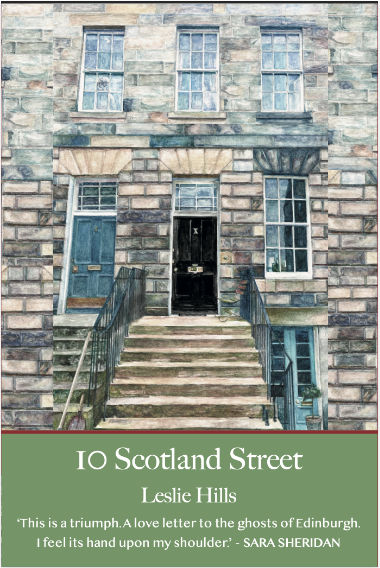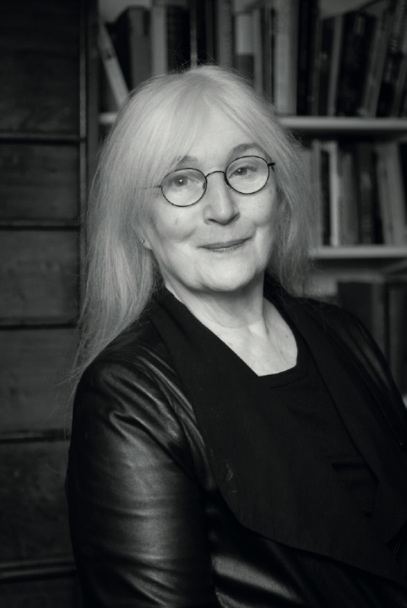10 Scotland Street
by Leslie Hills
The story of an Edinburgh home and its cast of booksellers, silk merchants, sailors, preachers, politicians, cholera and coincidence and its widespread connections over two centuries across the globe to the Caribbean, Irkutsk, Calcutta, Sydney...
This is a triumph. A love letter to the ghosts of Edinburgh. I feel its hand upon my shoulder.
Sara Sheridan

With a Foreword By Val McDermid
Val Mcdermid
Buying a house, we hope will become a home, is one of the exceptional rites of passage we undergo along the road to feeling like a grown-up. And who among us hasn’t studied those title deeds and wondered who were those people who lived here before us? What were their names? What kind of lives did they lead? What was the history absorbed by these four walls before we overlaid it with our possessions?
With most of us, that’s where it stops. We might spend an evening poring over our new abode’s history, exclaiming over the spidery copperplate of a Victorian clerk; trying to make sense of some obscure Georgian legalese; or just confused by what exactly a covenant means for us. But we tuck the paperwork away in a file, shove it in a drawer and forget about it till we sell up or pass it on to the next generation. If you’re anything like me, you’ll even forget which drawer it’s in and spend a frantic morning trying to unearth the vital documents.
Leslie Hills chose a different road. She decided she really did want to know whose ghosts inhabited her home at 10 Scotland Street, Edinburgh. She lives in the ground floor flat of a fine-looking sandstone tenement in the New Town of Edinburgh, an early example of formal town planning that transformed the city at the turn of the nineteenth century. The New Town is a grid of imposing buildings dotted with formal private gardens, constructed in response to the cramped, insanitary and inconvenient buildings on the far side of what had been the Nor’ Loch, a broad ditch that the denizens of Edinburgh had used as a dumping ground for their waste products.
Now, the noisome ditch was filled in, and the Old Town was linked to the New Town by bridges across the newly created valley. It must have been with a huge sense of relief that the gentry and the emerging middle classes moved across town to the new accommodations, but still within easy reach of the University, the Law Courts, the City Council chambers, the castle and the cathedral.
The flat that the Hills family moved into on a freezing January day in 1974 was not exactly the same as the one that David Keddie Whytt moved into in 1824. He bought it direct from the builders, though without the new housing guarantee given to modern buyers! The intervening two centuries have seen some structural changes to 10 Scotland Street, a not uncommon feature of New Town properties. But those changes are only a tiny fraction of the fascinating story that lies behind that imposing black door.
The story that Leslie unfolds for us spreads its threads across the globe. And it moves through different strata of society, painting a kaleidoscopic portrait of social, political, fiscal and financial life in Scotland and beyond, all through the lens of a single flat in a single city. Leslie takes us from the slave plantations of the Caribbean to the trading tentacles of the East India Company, from a blacksmith in New Zealand to a Victorian surgeon in Bonar Bridge in the Scottish Highlands. (The surgeon’s practice, by one of the many odd coincidences in this exploration, was in the very parish where the Hills family rented a remote cottage for two decades…)
……….
Although Leslie’s research started here, it took her a long way from home. But this is no dry recitation of records. Leslie’s own family’s experiences weave in and out of the extraordinary lives that have passed through 10 Scotland Street. As a film maker, she’s accustomed to teasing out the narrative threads that bring stories to life. And thanks to the bee in her bonnet that has driven her over the years to unravel the past of her own home, she has given us a fascinating account of the role of one house in the history of her city, her country, her world.

Leslie Hills
About the Author
Leslie Hills is a film producer at Skyline Productions. She has written extensively on education and the arts and has published short stories, but this is her first book. Full biog at www.skyline.uk.com